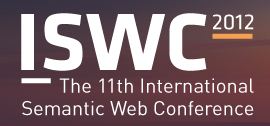News Story
KMi’s research into game-changing web solutions featured at top International Web Conference
Friday 23 Nov 2012
KMi’s work featured strongly in the research track at the International Semantic Web Conference (ISWC 2012) held in Boston, USA, last week, where our members presented 4 of the 40 papers. This is the premier international forum for the Semantic Web / Linked Data Community where scientists, industry specialists, and practitioners meet annually to discuss the future of practical, scalable, user-friendly, and game changing web solutions. KMi’s leadership in the field was also highlighted by the announcement of Harith Alani as program co-chair for ISWC 2013 to be held in Sydney, Australia.
In addition, the KMi-led application of these technologies at the Open University was also presented in the Industry Track (by Mathieu d’Aquin, in collaboration with Stuart Brown from Communication Services). This was an occasion to reflect and share our experience and the lessons learnt in the last two years on creating a linked data platform (data.open.ac.uk) which has slowly become a core part of the university’s information infrastructure, with clear impact on some areas of its business practices. One materialisation of such an impact is the development of the DiscOU service (http://discou.info), which demonstrates how linked data can be used to support the discovery of open educational resources from other online resources (here BBC programmes). DiscOU was shown at the demo session of the conference. Both presentations related to the application of linked data at the Open University generated much discussion and excitement, making several members of other universities to consider the benefits of linked data and the possible applications of DiscOU for their own institution.
The KMi-authored research track papers were:
In the Knowledge Discovery session, Chenghua Lin presented a paper entitled "Feature LDA: a Supervised Topic Model for Automatic Detection of Web API Documentations from the Web" in the research track, co-authored by Yulan He, Carlos Pedrinaci and John Domingue. The paper, funded by the FP7 project VPH-Share, proposes a novel approach to text classification, based upon a probabilistic framework, and which outperforms the current state-of-the-art. The model serves as the main component for our on-going work to build a next-generation search engine for Web APIs. Web APIs form the main technological building block of eCommerce as they allow agents to buy and sell goods and services on the Web. A current barrier to use is that to current search engines, such as Google, Web APIs are indistinguishable from normal Web pages. Our approach, as described in the paper, begins to tackle this problem. Also in this track, Matthew Rowe (ex-KMi, now a lecturer at Lancaster University) presented a paper titled "Who will follow whom? Exploiting Semantics for Link Prediction in Attention-Information Networks", co-authored with Milan Stankovic from Hypios Research, and Harith Alani from KMi. The paper presents a novel approach for using concept graphs to predict follower edges in directed social networks.
The Information Exchange session included Enrico Motta’s paper entitled ”Mining Semantic Relations between Research Areas” which was co-authored with Francesco Osborne of University of Torino. This presented a novel algorithm for finding relationships between keywords found in web documents and its application to the problem of providing a robust semantic structure which can enable the efficient navigation and analysis of very large collections of research publications. In particular this approach is fully automatic and avoids the need for manual curation of archives of research publications. Indeed, this team later also gave a demonstration of Rexplore, an application for making sense of research publications on the web, which was one of the most successful demonstrations at the conference.
Finally, in the Social & Collaborative Semantics session, Hassan Saif presented a paper “Semantic Sentiment Analysis of Twitter”, which examined the value of using semantic features for the classification of positive and negative sentiment in Tweets.
The KMi contributions to the conference can be viewed online at the conference website.
Related Links:
Latest News
KMi’s report from SEMANTiCS 2025
KMi wins OU recognition of Excellence in Teaching Award
KMi experts present insights on Technology-Facilitated Gender-Based Violence to UN committee
KMi with a impactful presence at Open Repositories 2025
Alexander Mikroyannidis appointed International Expert in Distance Learning by A3ES

